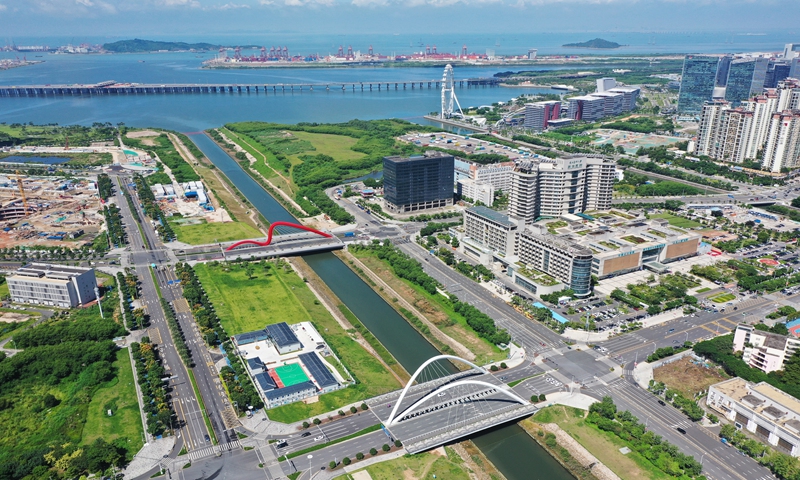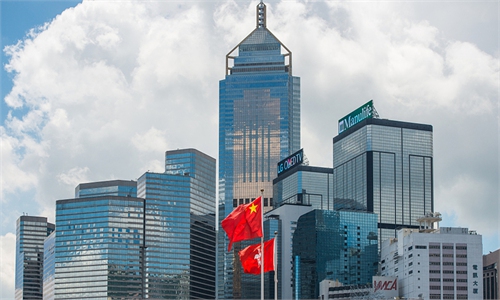
Qianhai Shenzhen-Hong Kong Modern Service Industry Cooperation Zone in South China's Guangdong Province Photo: VCG
Hong Kong Special Administrative Region (SAR) chief executive John Lee said on Wednesday that the SAR's financial system remains resilient, expressing his full confidence in the regional development of the Guangdong-Hong Kong-Macao Greater Bay Area (GBA) despite challenges in the world's geopolitical and economic landscape.
Speaking at the Phoenix Financial Forum for the Greater Bay Area 2022, Lee said that the construction of the GBA is a major development strategy as part of the country's reform and opening up in the new era, which also brings more growth opportunities to the region.
Hong Kong SAR, as a "resilient global finance and trading hub", will continue to boost the region's future development, he said.
Hong Kong is continuously reinforcing its connectivity with the Chinese mainland through capital market links, such as Shanghai-Hong Kong Stock Connect and Shenzhen-Hong Kong Stock Connect, the cross-boundary investment channel that connects the stock exchanges in Shanghai and Shenzhen with the Hong Kong Stock Exchange.
The assets under management in Hong Kong reached HK$35.5 trillion last year, of which 65 percent came from foreign countries and regions, Lee said, indicating that Hong Kong owns resilient strength to become the preferred asset and wealth management hub in the GBA, and in Asia.
A series of measures backed up by the Central Government have helped strengthen the pilot role of the GBA in which Hong Kong's position as an international trade and finance hub will be further consolidated.
In early September, a concentrated rollout of development and opening-up plans for GBA was launched in deepening the opening-up of the Qianhai Shenzhen-Hong Kong Modern Service Industry Cooperation Zone, a development zone located in Shenzhen that is known for opening-up pilot policy.
Among the plans, including the establishment of an international-standard modern services industry development mechanism that links Hong Kong and Macao. The plans reflect the government's effort to stimulate cooperation among regions across the GBA, as the current level of economic interaction is not sufficient, experts said.
Moreover, the rapid development of Hong Kong's offshore yuan business has created further impetus for Hong Kong's growth as an international financial center, Dai Xianglong, former governor of the People's Bank of China, the central bank, said at the forum on Wednesday.
Hong Kong has the world's largest offshore yuan capital pool, processing about 75 percent of the world's offshore yuan settlements.
In July, the People's Bank of China and the Hong Kong Monetary Authority announced the optimization of the currency swap agreement as a standing agreement, the SAR chief said, saying that in the future, the Hong Kong Monetary Authority will optimize the yuan liquidity arrangement to support the sustainable development of the offshore yuan market in Hong Kong.
Consolidating and enhancing Hong Kong's status as an international financial center is of great significance to the economic and social development of the GBA and Asia, Dai said.
At the same time, the economic growth of the Chinese mainland and the GBA has also continuously supported the consolidation of Hong Kong's status as an international financial center, Dai said.


